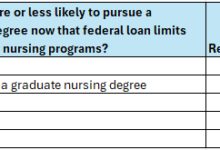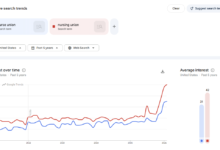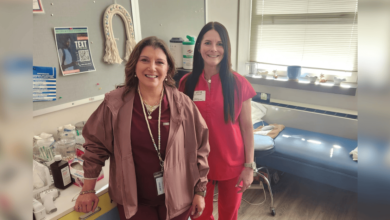Streeting backs nurse innovation but warns NHS must deliver better value

District nurses should be able to prescribe wound dressings and nurses who want to innovate should not be held back by the “dead weight of management bureaucracy”, according to Wes Streeting.
More controversially, the Labour Party shadow health and social care secretary has also accused the NHS of waste, inefficiency, and of using the winter crisis as “an excuse to ask for more money”.
Mr Streeting, who would likely be health and social care secretary if his party won the next election, laid out his vision for the NHS during a visit to Singapore over the weekend.
“At the moment, I think we get the worst of all worlds, which is poor outcomes alongside poor value for taxpayers”
Wes Streeting
In an interview with The Times during the visit, Mr Streeting said that, if elected, his party “would not” look to reorganise the NHS, but promised improvements to its efficiency.
Among these pledges were a return to a “family doctor” system, further investment in the NHS app, streamlining GP targets – and regulating NHS managers to allow them to be struck off for misconduct.
He suggested that giving district nurses limited prescription powers, for wound dressings, could reduce the number of referrals a patient experiences and speed up their care.
However, in comments likely to be seen as controversial, Mr Streeting also said the NHS must “get used” to the fact “money is tight.”
“The NHS is going to have to […] rethink where and how care is delivered to deliver better outcomes for patients and better value for taxpayers’ money.” He said.
“At the moment, I think we get the worst of all worlds, which is poor outcomes alongside poor value for taxpayers.
“I think people working in the NHS and the patients using the NHS can see examples of waste and inefficiency,” the MP for Ilford North told The Times.
“I don’t think it’s good enough that the NHS uses every winter crisis and every challenge it faces as an excuse to ask for more money,” he said.
The would-be secretary of state said the NHS was a “contrast” to what he saw in Singapore, after a visit to Singapore General Hospital, where patients were able to request water or food via a bedside tablet.
These tablets could also be used to flag down a nurse if they were in pain or check their patient records via an electronic system.
Mr Streeting added: “I definitely think there is an institutional and structural problem in the way the NHS works. It claims to be patient-centred, but it really isn’t.”
He later said he would like to shake the NHS and the public “out of complacency”, and said: “People need to hear the truth about the NHS.
“It is not the envy of the world, it is not delivering the quality of care that any of us want and unless it changes, it’s not going to survive,” he warned.
In addition, Mr Streeting said that the NHS was “perfectly capable” of arranging GP appointments in a more efficient way, but that the system “isn’t wired” for this level of efficiency.
Meanwhile, he told The Times that he wished to promote the use of digital technology and innovation for the purposes of improving both care and patient choice.
He said he would look to give patients the power to swap their GP via the NHS app if they chose to, allow all patients to see their medical records online, and allow parents to see that of their children’s.
“I’m willing to give people more freedom to innovate and create as long as they deliver,” he said. “That’s the tough love that people can look forward to if I become the health and social care secretary.”
But many healthcare workers, including nurses, on social media expressed their unhappiness with Mr Streetings’ comments, in particular about the winter crisis.
Harry Eccles, a mental health nurse, said on X (formerly Twitter): “[Mr Streeting] needs reminding that the vast majority of Britons, and Labour voters, support a fully funded and publicly owned NHS.
“His job is to fight for a fully funded NHS free from privatisation. His job is to safeguard staff and patients,” he said.
Another nurse, who posted on X under the alias Tiz Broken, said that with each winter “worse than the previous”. “It’s not an excuse for more money […],” she said.
“When I left off at 8pm yesterday there was no patient flow with numerous patients waiting for inpatient beds, including many on chairs in the waiting room and four on trolleys in the corridor,” she said
Also responding to the interview, Helga Pile, acting head of health at the union Unison, said: “NHS staff have known nothing other than tight budgets for the past decade.
”Any incoming government will face a huge challenge in repairing the damage done by years of under-investment in equipment, buildings and the workforce,” she said.
“Making the NHS a better place to work and filling the thousands of vacancies must be the starting point for the innovations and improvements the sector so desperately needs.”
NHS Confederation chief executive Matthew Taylor said that health service leaders have been supportive of “much of the direction of travel” that the shadow secretary had indicated, including more emphasis on community care, public health, and more digital technology.
However, Mr Taylor said it is “not sustainable” for the NHS to “do more with less”. “[This] often means staff needing to do more than we should reasonably ask,” he wrote on his X page.
“In a context of over 100,000 vacancies, huge retention challenges and where members tell us a growing number of staff end their shifts in tears, messages implying the NHS isn’t making best use of resources or doing enough only further damages morale.
“Newspaper interviews are for the electorate, not the sector,” he said. “At this stage of the electoral cycle, the NHS should expect to hear messages that make us bristle and the overwhelming majority want to play their part in making the service better.
“It is right that patient experience is the focus for someone that may become secretary of state in the next year or so, but the challenges we see now will only get worse if we see increasing numbers of dedicated but burnt out staff leave the health service.”






